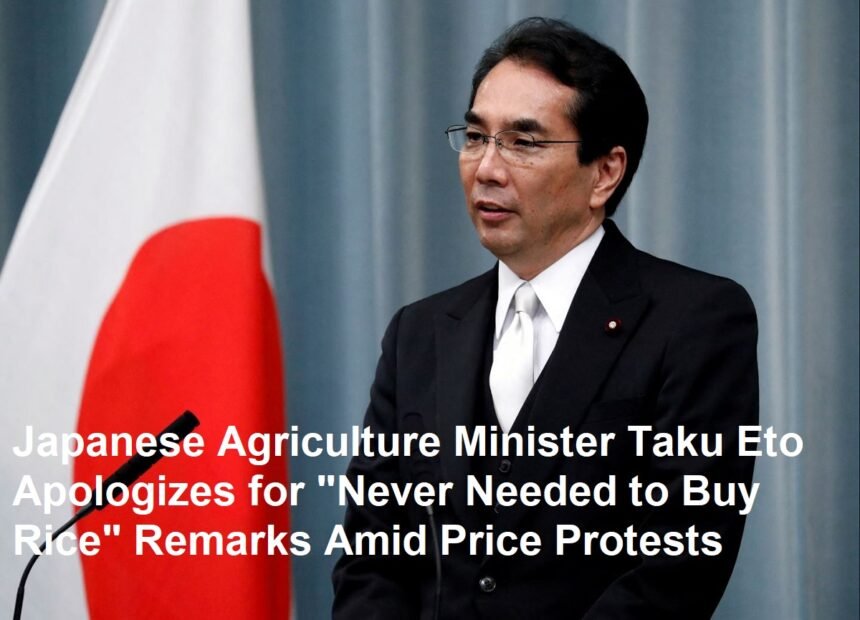On Monday, May 19, 2025, Japan’s Agriculture Minister Taku Eto issued a public apology following widespread backlash over his controversial statement that he “never needed to buy rice.” The remark came at a time when many Japanese citizens are grappling with rising rice prices, sparking protests and concerns about food affordability. The incident has drawn significant attention to Japan’s agricultural policies and the political sensitivity surrounding staple food prices in the country.
Context of Rising Rice Prices and Public Concerns
In recent months, Japan has experienced a notable increase in rice prices, driven by a combination of factors including adverse weather conditions affecting harvests, rising production costs, and global supply chain disruptions. Rice, being a fundamental part of the Japanese diet and culture, holds a special place in the public consciousness. The price hikes have placed financial strain on many households, particularly those with lower incomes and elderly populations who rely heavily on rice as a dietary staple.
The government’s agricultural policies, including subsidies and import regulations, have long aimed to protect domestic rice farmers and maintain stable prices. However, the recent surge in prices has led to growing dissatisfaction among consumers, who have voiced their concerns through protests and social media campaigns demanding government intervention to control costs and ensure food security.
Minister Taku Eto’s Controversial Statement
Amid this tense atmosphere, Minister Taku Eto made a statement during a press briefing on May 19, 2025, that ignited public outrage. He remarked that he “never needed to buy rice,” implying a disconnect from the everyday struggles faced by ordinary citizens. The comment was perceived as insensitive and out of touch, especially given the ongoing price protests and the economic challenges confronting many Japanese families.
The statement quickly went viral, prompting criticism from opposition politicians, consumer advocacy groups, and the general public. Many accused the minister of lacking empathy and understanding of the real impact of rising food prices on the population.
Public Reaction
The backlash was swift and widespread. Protesters gathered outside the Ministry of Agriculture offices, demanding a formal apology and concrete measures to address the rice price issue. Social media platforms were flooded with messages condemning the minister’s remarks, with hashtags calling for his resignation trending nationwide.
Consumer groups highlighted the importance of government officials demonstrating awareness and sensitivity to citizens’ hardships, especially regarding essential goods like rice. The controversy also reignited debates about the effectiveness of Japan’s agricultural policies and the need for reforms to balance farmer support with consumer protection.
Minister Eto’s Apology
In response to the mounting criticism, Minister Taku Eto issued a public apology later on May 19, 2025. He stated:
“I deeply regret my recent remarks suggesting that I have never needed to buy rice. It was an insensitive comment that does not reflect my understanding of the difficulties many Japanese families are currently facing due to rising rice prices. I sincerely apologize to the public for any offense caused. As Minister of Agriculture, I am committed to working diligently to address these concerns and ensure that rice remains affordable and accessible to all.”
Political Implications
The incident has significant political ramifications for the ruling government, which is already under pressure to manage inflation and economic challenges. Minister Eto’s comments have been seized upon by opposition parties as evidence of the administration’s disconnect from ordinary citizens. The controversy may weaken public trust in the government’s ability to handle food security and agricultural issues effectively.
Furthermore, the episode underscores the delicate balance policymakers must maintain between supporting domestic farmers and protecting consumers from price volatility. It also highlights the importance of communication and empathy from public officials in maintaining public confidence.
Historical Context of Rice Policy in Japan
Japan’s rice policy has historically been characterized by protectionism, with strict import controls and subsidies designed to preserve domestic production and rural livelihoods. Rice farming is deeply embedded in Japanese culture and tradition, and the government has long prioritized self-sufficiency in this staple crop.
However, these policies have sometimes led to higher prices compared to global markets, sparking debates about the need for liberalization and modernization. The current price surge and public discontent reflect ongoing tensions between maintaining traditional agricultural practices and adapting to contemporary economic realities.
Potential Policy Changes Following the Controversy
In the wake of the controversy, there are growing calls for the government to review and possibly reform its rice policies. Potential measures include increasing subsidies to offset production costs, enhancing support for farmers to improve yield and efficiency, and exploring ways to stabilize prices through strategic reserves or import adjustments.
Additionally, the government may seek to improve transparency and communication with the public to rebuild trust. Minister Eto’s apology and commitment to action suggest that the administration recognizes the urgency of addressing both the economic and social dimensions of the rice price issue.
In conclusion, Minister Taku Eto’s public apology for his “never needed to buy rice” remarks comes at a critical juncture for Japan’s agricultural sector and food policy. The incident has brought to light the challenges faced by consumers amid rising prices and the political sensitivity surrounding staple food affordability. Moving forward, effective policy responses and empathetic leadership will be essential to restore public confidence and ensure food security in Japan.









